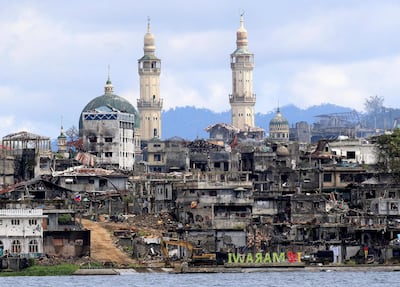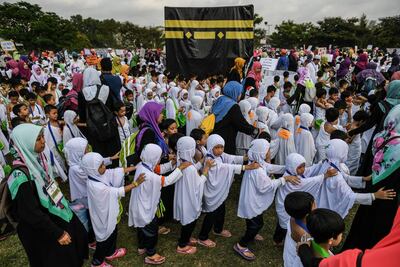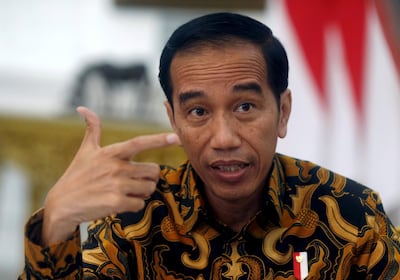President Emmanuel Macron may have made headlines with his call to battle Islamist extremism after four people were murdered by assailants purportedly driven by that twisted ideology in France during October, but the necessity for such action is universal. It is so even in South-East Asia, which may come as a surprise to some. The region's roughly 250 million Muslims make up significant minorities in several countries – Singapore, Thailand, the Philippines, Myanmar and Cambodia – but are chiefly concentrated and are the majority in Indonesia and Malaysia: two countries with a reputation for moderation and pluralism.
True, there have been instances of terrorism for years, from the Bali bombings of 2002 and 2005 that killed over 200 people and were perpetrated by Al Qaeda-linked Jemaah Islamiyah, to the 2017 partial takeover of Marawi City in the southern Philippines by two organisations associated with ISIS, Abu Sayyaf and the Maute group.
However, on the whole – apart from in the Philippines, where an insurgency in the mainly Muslim south lasted for decades – these are the exceptions, not the rule. And these are not least due to strong work by the local intelligence services. The overall impression that the region is not stricken by extremist terror is correct. I would feel safer from that threat in South-East Asia’s capitals than in Europe’s at the moment.

But, as per Mr Macron, the dangers of extremism do not just come from the possibility of physical loss, of life, limb or property. They are also about the spread of an attitude that, while often harder to discern, threatens to undermine the cohesion, harmony and tolerance of peaceful, forward-looking societies.
In Indonesia, the rapturous welcome given to the firebrand cleric Rizieq Shihab on his return from exile – he fled criminal charges at home – is one case in point. Rizieq, the leader of the thuggish and misnamed Islamic Defenders Front, has been imprisoned twice, once for “inciting violent acts and spreading hatred against the lawful government of Indonesia", as the trial judge put it. While living abroad, he was questioned by police for flying a black flag, which resembled those used by extremist groups, at the back of his house. On Sunday night, six of his supporters were killed in a shoot-out with police.
The reappearance of this hardliner, and his evident support with a section of the population, does not bode well. Neither did news that Jemaah Islamiyah had managed to collect funds by putting up charity boxes in several different parts of the country, using the money – according to a police spokesman – to send members for military training and to buy weapons and explosives.
With the charity boxes, the public may well have been deceived. But the Jemaah Islamiyah operatives had clearly been facilitated by sympathisers. And it is these, and those who are insufficiently condemnatory of terrorism, that are encouraged and enabled by not tackling extremism vigorously enough.

To take another, personal example: for several years I worked at Malaysia’s national think tank, the Institute for Strategic and International Studies. During that time, at least two taxi drivers looked at the address – the institute goes by “ISIS Malaysia” – and evidently thought that it was a local affiliate of the terror outfit. One looked very shocked. The other said, as we were driving out the gates: “Are you a Muslim? I assume you have to be to work there.” He wasn’t joking. It was worrying, to say the least, that they both thought it possible that ISIS was able to set up an office in Malaysia.
On another occasion one Malaysian minister recalled a friend’s daughter coming round to his new house to advise on interior decoration. He and his wife were appalled to see that her computer screen saver was the ISIS flag.
The people involved in the cases above are not necessarily supporters of terrorism. But each, in their own way, warn, as Mr Macron has, of the risk of not checking the insidious culture of extremism. Quite apart from the harm it does to inter-communal relations and, indeed, within Muslim communities, radicalisation experts have repeatedly alerted that this ideology can be a slope towards eventually justifying violence and murder.

Fortunately, in both countries governments have been firm in opposing it. Subsequent Malaysian prime ministers have made the need for moderation their watchword and have supported sterling anti-radicalisation and de-radicalisation programmes. In Indonesia, President Joko Widodo should be congratulated for taking several steps, including setting up a National Agency to Promote Pancasila to sideline radicals ("Pancasila" is the country’s inclusive guiding philosophy, which specifically recognises Christianity, Buddhism, Hinduism and Confucianism as well as Islam).
In both countries, religious parties have long sat in their respective parliaments. In Malaysia, one is part of the governing coalition. Mr Joko’s Vice President Maruf Amin is a former head of Indonesia’s largest Muslim organisation, Nahdlatul Ulama, which has over 80 million members. What these groups have in common is their acceptance of working within the system. This is unlike the extremists whose aims are ultimately revolutionary and intolerant: to disrupt and destroy, and to oppress those who disagree with them.

Making this distinction and acting against the extremists is crucial. One of the reasons that prompted Mr Joko is said to have been a survey that showed that 20 per cent of Indonesia’s civil servants were in favour of creating an “Islamic theocratic state”. The President wanted “hardline and radical officials weeded out”, a senior official told Reuters.
He was certainly right in that. Returning to Mr Macron: his words – perhaps awkwardly expressed – may have caused apprehension in some Muslim countries, but his desire to fight Islamist extremism is one they ought to share. It is a scourge that falsely hides behind and traduces a religion of peace, tolerance and love for all humanity. All need to be on their guard against it.
Sholto Byrnes is an East Asian affairs columnist for The National


